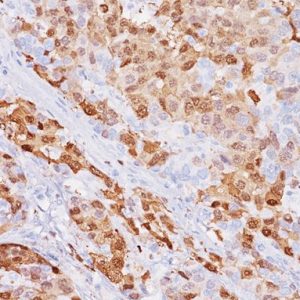Description
SMAD4 is a DNA-binding protein that belongs to the SMAD family of transcription factors. Activated SMAD4 complexes accumulate in the nucleus and act as mediators of TGF-β signal transduction (1,2). SMAD4 mutations or deletions are linked to hereditary hemorrhagic telangiectasia syndrome, and juvenile polyposis syndrome (1). SMAD4 mutations or deletions have also been implicated in multiple cancer indications including cholangiocarcinoma, colorectal, head and neck, and pancreatic cancer (2,3).
SPECIFICATIONS
Specifications
| INTENDED USE | IVD |
|---|---|
| SOURCE | Rabbit Monoclonal |
| SPECIES REACTIVITY | Human; others not tested |
| CLONE | EP618Y |
| ISOTYPE | IgG |
| ANTIGEN | SMAD4 |
| LOCALIZATION | Nuclear and cytoplasmic |
| POSITIVE CONTROL | Appendix, tonsil, pancreas, colon adenocarcinoma, pancreatic adenocarcinoma |
DATASHEETS & SDS
REFERENCES
1. Zbuk KM, Eng C. Hamartomatous polyposis syndromes. Nat Clin Pract Gastroenterol Hepatol. 2007 Sep;4(9):492–502. 2. Zhao M, Mishra L, Deng CX. The role of TGF-β/SMAD4 signaling in cancer. Int J Biol Sci. 2018;14(2):111. 3. Lin LH, et. al. SMAD4 Somatic Mutations in Head and Neck Carcinoma Are Associated With Tumor Progression. Front Oncol. 2019 Dec 6;9:1379. 4. Center for Disease Control Manual. Guide: Safety Management, NO. CDC-22, Atlanta, GA. April 30, 1976 “Decontamination of Laboratory Sink Drains to Remove Azide Salts.” 5. Clinical and Laboratory Standards Institute (CLSI). Protection of Laboratory Workers from Occupationally Acquired Infections; Approved Guideline-Fourth Edition CLSI document M29-A4 Wayne, PA 2014.







Reviews
There are no reviews yet.